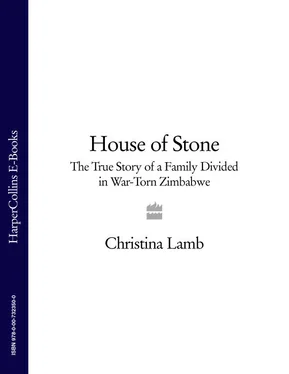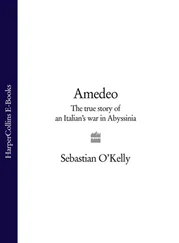House of Stone
THE TRUE STORY OF A FAMILY DIVIDED IN WAR-TORN ZIMBABWE
CHRISTINA LAMB

To my parents who taught me there are always at least two sides to a story
Among the gold mines of the inland plains between the Limpopo and Zambezi rivers [there is a] … fortress built of stones of marvellous size, and there appears to be no mortar joining them … This edifice is almost surrounded by hills, upon which are others resembling it in the fashioning of stone and the absence of mortar and one of them is a tower more than 12 fathoms high.
VICENTE PEGADO, captain at the Portuguese garrison of Sofala,
on seeing the ruins of Great Zimbabwe,
dzimba dza mabwe, House of Stone, 1531
I have one great fear in my heart-that one day when they are turned to loving they will find we are turned to hating.
ALAN PATON, Cry, the Beloved Country (1948)
Title Page House of Stone THE TRUE STORY OF A FAMILY DIVIDED IN WAR-TORN ZIMBABWE CHRISTINA LAMB
Dedication To my parents who taught me there are always at least two sides to a story
Epigraph Among the gold mines of the inland plains between the Limpopo and Zambezi rivers [there is a] … fortress built of stones of marvellous size, and there appears to be no mortar joining them … This edifice is almost surrounded by hills, upon which are others resembling it in the fashioning of stone and the absence of mortar and one of them is a tower more than 12 fathoms high. VICENTE PEGADO, captain at the Portuguese garrison of Sofala, on seeing the ruins of Great Zimbabwe, dzimba dza mabwe, House of Stone, 1531 I have one great fear in my heart-that one day when they are turned to loving they will find we are turned to hating. ALAN PATON, Cry, the Beloved Country (1948)
Prologue
1 Zhakata's Kraal, 1970
2 Riversdale Farm, Headlands, 1971
3 Zhakata's Kraal, 1973
4 Train to Salisbury, 1974 49
5 Zhakata's Kraal, 1974
6 Salisbury, 1976
7 Marondera, 1980
8 Salisbury, 1980
9 Dombotombo township, Marondera, 1986
10 Victoria Falls, 1990
11 Marondera, 1993
12 Guanghzou, China, 1991
13 Marondera, 1999
14 New Life Centre Church, Marondera, 16 April 2000
15 Zhakata's Kraal, 2001
16 Kendor Farm, May 2002
17 Kendor Farm, 5 August 2002
Postscript
Epilogue - Great Zimbabwe, November 2005
Chronology
Glossary
Acknowledgements
About the Author
Praise
Also by Christina Lamb
Copyright
About the Publisher
THE WAR VETERANS had been living at the bottom of the garden for months. Every afternoon the family would take tea on the terrace and stare beyond the swimming pool and children's tree house to the plumes of smoke rising from the round thatched huts that the squatters had built. Every night the family tossed and turned to their drumming and chanting. The next morning the farmer would find the carcasses of the cattle that the intruders had slaughtered.
Kendor Farm was in Wenimbi Valley in the rich tobacco-growing district of Marondera. Tobacco was Zimbabwe's main export, and for the previous two and a half years neighbouring farms all around them had endured similar invasions. The first murder of a white farmer had happened only a few miles away on 15 April 2000. Since then many farmers had been badly beaten; some had been hacked to death. Most had been either kicked off or fled. By August 2002 the morning roll call over the radio, started to check on the safety of local farmers, had stopped because Kendor was the only white farm left in the valley.
The Hough family had thought about leaving. But the 1,400-acre ostrich and tobacco farm and eight-bedroom house with its sweeping view over the balancing rocks and floaty canopy of msasa trees was their dream. They had worked hard for the farm and sunk all their money into it. They wanted their children to grow up as they had and could not imagine starting all over again. Other white farmers who had moved abroad to England or Australia had ended up driving minicabs and living in poky council flats. Besides, it was not only them. On the land they had a factory producing bags and shoes from ostrich leather and they employed 300 people as well as running an orphanage for children whose parents had died in the AIDS pandemic.
One morning, Claire Hough had gone to take the children to school and her husband Nigel had left for a meeting in town when their manager called in a panic. A crowd of people had arrived at the gate waving a letter demanding the farm. Nigel grabbed a friend and rushed back in his pick-up. By the time they got there, the mob had started a fire in his driveway, taunting him and barring their way with sticks and shamboks. ‘Hondo, hondo’ they chanted, Shona for ‘war’. He could see that some of his furniture had been taken out of the house and piled up in front of the terrace.
Nigel telephoned the police but they refused to come, saying they did not involve themselves in ‘domestic matters’. By now the crowd had surrounded him, dragging him off, nostrils flaring as they scented blood. ‘This is not Rhodesia any more!’ shouted one man. ‘Go back to your own people.’ As they pulled him towards an outhouse, Nigel noticed that some of the women had draped themselves in his wife's scarves and dresses and were tossing around his children's stuffed animals. Then he noticed something else.
In the front was Aqui Shamvi, the woman who had worked as their maid and much-loved nanny to their children since their first baby had been born six years earlier. To the Houghs she was almost part of the family. Now she was transformed. ‘Get out or we'll kill you!’ she spat at him, eyes rolling with hatred. ‘There is no place for whites in this country!’
* * *
I first met the Houghs (pronounced Huff) and their maid Aqui (Ack-we) in August 2002 when they were all still living on Kendor Farm. Their relationship seemed different to me from any other I had seen between white farmers and black servants in Zimbabwe, and rather uplifting at a time when Robert Mugabe's government was promoting racist hate-speak in the state media.
The Houghs encouraged me to talk to Aqui and she was refreshingly candid as well as stunning in her red and white polka-dot uniform and green headscarf, and with her great big laugh. The setting was both sinister and surreal-we all sat on the terrace chatting and taking tea and Madeira cake trying to ignore the wood-smoke rising from the huts of war vets at the end of the lawn. To get to the farm had involved negotiating a series of roadblocks manned by youth militia adorned with Mugabe bandannas, their eyes bloodshot from smoking weed. Marondera was only an hour's drive outside Harare and its rich red soil had made the area one of the main targets of the government's land grab.
I wrote an article about the farm in the Sunday Telegraphy for which I was then diplomatic correspondent. In it, I described Nigel Hough as ‘a model white farmer’ for all his involvement with the local community and pointed out that to take his farm would expose the fact that the government was clearly not interested in helping its people.
A week later, to my horror, the farm was seized.
At that time, like many, I could not believe that Mugabe was really serious about seizing all the white-owned farms. The land distribution was undoubtedly unfair, with most of the productive land still in white hands. But the 5,000 commercial farms produced most of the food for the nation, were the country's biggest employer and responsible for 40 per cent of its export earnings.
Читать дальше













